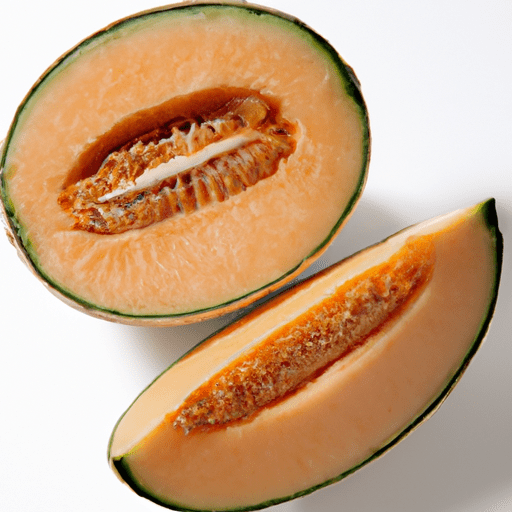The Sweet and Refreshing Cantaloupe: A Delightful Addition to Your Summer Recipes
Summer is the season of sunshine, relaxation, and vibrant flavors. When it comes to capturing the essence of summer, the cantaloupe fruit takes center stage. With its juicy, sweet flesh and refreshing flavor, cantaloupe has become a popular and versatile ingredient in various culinary delights. In this article, we will dive into the enticing world of cantaloupes, exploring their taste, common uses in cooking, nutritional value, and other interesting facts that make them a must-have addition to your summer menu.
Tantalizing Taste and Aroma
Cantaloupes are known for their intoxicatingly sweet and subtly musky taste. When perfectly ripe, their luscious, orange flesh offers a delicate balance of sweetness with hints of floral and tropical notes. Cutting into a ripe cantaloupe releases a heavenly aroma that is both invigorating and tantalizing, a true invitation to indulge in its irresistible flavors.
Versatility in Culinary Delights
Cantaloupes are incredibly versatile and can be incorporated into a wide array of culinary creations. Here are a few popular ways to enjoy this delightful fruit:
1. Enjoying Fresh Cantaloupe: The simplest way to savor the flavor of cantaloupes is by enjoying them fresh. Slice the fruit into cubes, balls, or wedges, and indulge in its refreshing taste on a hot summer day. Alternatively, make a fruit salad by combining cantaloupe with other seasonal fruits to create a vibrant and healthy dish.
2. Delectable Desserts: Cantaloupe is an excellent addition to various sweet treats. Puree the fruit and use it as a base for a refreshing sorbet or use it as a topping for ice cream. You can also include diced cantaloupe in fruit tarts or blend it into a smoothie for a burst of sweet indulgence.
3. Savory Combinations: Cantaloupe’s succulent flavor extends beyond desserts. Its sweet and juicy nature can add a pleasant twist to savory recipes. Incorporate diced cantaloupe into salsas, salads, or even cold soups to introduce a surprising touch of sweetness that pairs perfectly with tangy flavors and fresh herbs.
Nutritional Benefits of Cantaloupe
Not only are cantaloupes delicious, but they also offer an impressive range of health benefits. These fruits are rich in essential nutrients, making them an excellent addition to a balanced diet. Here are some notable nutritional benefits of cantaloupes:
1. Hydration: Cantaloupes have a high water content, making them a perfect choice for staying hydrated during hot summer days. The fruit’s natural electrolytes also help restore your body’s mineral balance.
2. Vitamin C Powerhouse: Cantaloupes are an abundant source of vitamin C, an immune-boosting antioxidant known for its role in maintaining healthy skin and promoting collagen production.
3. Fiber-Rich Fruit: A single cup of cantaloupe provides a significant amount of dietary fiber, aiding in digestion and promoting a healthy gut.
4. Nutrient Density: Cantaloupes contain a variety of essential nutrients, including vitamin A, potassium, and folate, all of which contribute to overall health and wellbeing.
Fascinating Facts and History
- Cantaloupes belong to the Cucurbitaceae family, which includes other melons, such as honeydew and watermelon.
- Originating from the Middle East, cantaloupes have a rich history dating back thousands of years. They were cultivated in ancient Egypt and later spread to other parts of the world.
- The term “cantaloupe” originally referred to a specific type of melon grown in the region of Cantalupo, near Rome, Italy. It eventually became a generic term for muskmelons in English-speaking countries.
- In many cultures, cantaloupes are considered a symbol of abundance, fertility, and good luck.
Conclusion
Cantaloupes are a delightful and versatile fruit that brings a burst of sunshine into your summer recipes. Whether enjoyed fresh, incorporated into desserts, or used in savory dishes, their sweet flavor and refreshing qualities are sure to impress. Moreover, with their impressive nutritional profile and fascinating history, cantaloupes offer a wholesome and delightful addition to your culinary adventures. Embrace the essence of summer and invite the irresistible flavor of cantaloupes into your kitchen this season.
Origin of Cantaloupes: Cantaloupes, also known as muskmelons, are believed to have originated in ancient Persia (modern-day Iran). They were later introduced to Europe and eventually made their way to the Americas through trade and exploration.
Common Uses of Cantaloupes: Cantaloupes are often enjoyed fresh as a snack or used in various culinary preparations. They are commonly used in fresh fruit salads, smoothies, sorbets, and desserts. Cantaloupes are also popular in savory dishes and are used in salads, salsas, and as a topping for grilled meats.
Nutritional Benefits of Cantaloupes: Cantaloupes are low in calories and provide essential nutrients. They are an excellent source of vitamin C, which helps boost the immune system and supports healthy skin. Cantaloupes also contain significant amounts of vitamin A, which is important for vision and healthy skin. Furthermore, they are a good source of dietary fiber, which aids in digestion.
Unique Properties of Cantaloupes: One unique property of cantaloupes is their high water content, which makes them a refreshing and hydrating fruit. Additionally, cantaloupes have a distinct aroma and a sweet, juicy flavor. Their orange flesh is often rich in beta-carotene, giving it a vibrant color.
Historical Significance of Cantaloupes: Cantaloupes have a rich history and have been cultivated and enjoyed for centuries. In the 16th century, European explorers brought cantaloupes from their travels in the Middle East to share this delicious fruit with the world. Cantaloupes have since become popular worldwide and are often associated with summer and picnics.




Use the share button below if you liked it.
It makes me smile, when I see it.